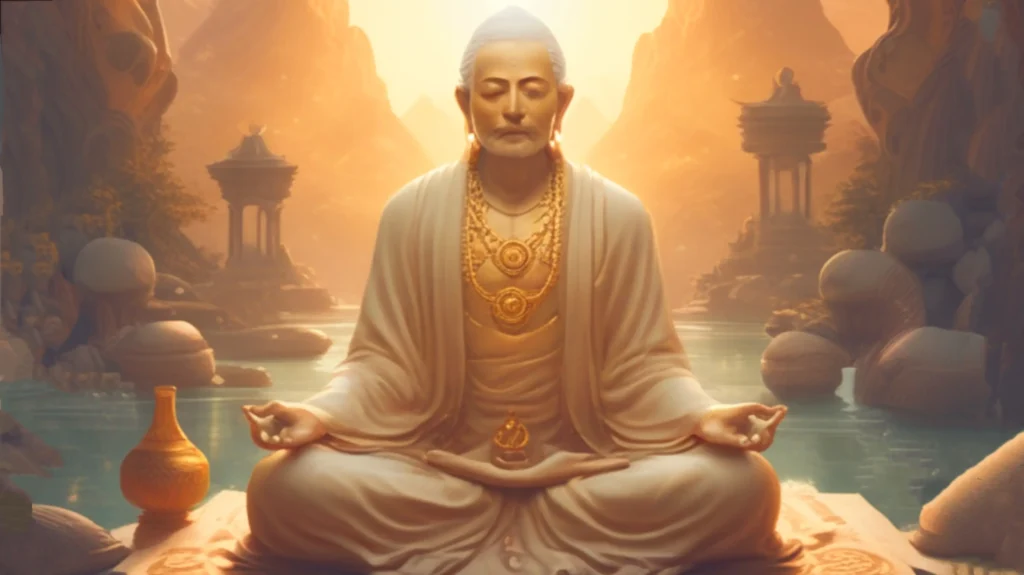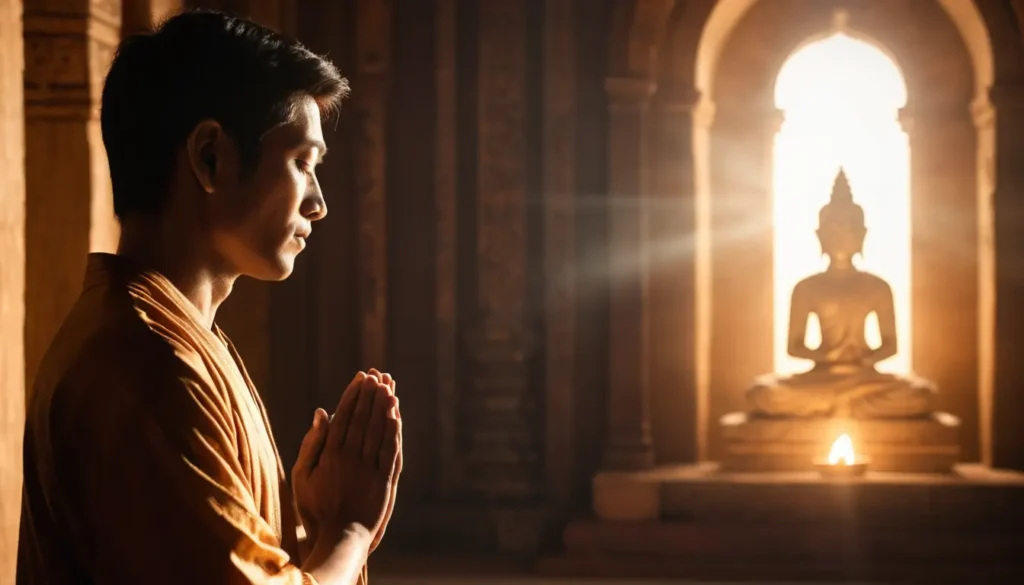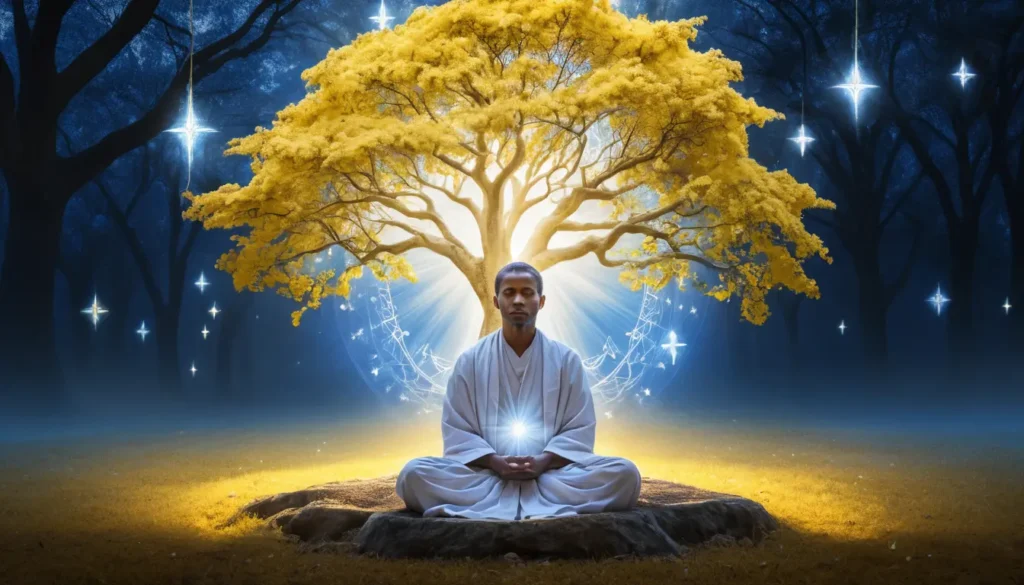If you think of yourself as a seeker of knowledge and purpose, you’re in the right place. The Bhagavad Gita isn’t just a scripture; it’s a guide to living a balanced, meaningful life. Today, we’re thrilled to take you through a summary of its 18 chapters—each one a gem offering profound insights on life, duty, and the path to enlightenment.
Chapter 1: Vishada Yoga – The Yoga of Dejection

In this opening chapter, Arjuna faces confusion and doubt as he prepares for battle, questioning his purpose and the morality of his actions. It reflects how misplaced attachments can lead to inner turmoil and hinder righteous action.
Takeaway: This chapter teaches us that without clarity and purpose, one’s actions become clouded by emotional attachment.
Chapter 2: Sankhya Yoga – The Yoga of Knowledge

Arjuna is introduced to the concept of self-realization through right action. Krishna teaches him about karma, the importance of duty, and how to maintain a calm mind, even in pain or pleasure, gain or loss.
Takeaway: The journey of self-realization starts with balanced action—working without attachment leads to peace and fulfillment.
Chapter 3: Karma Yoga – The Yoga of ActiON

Krishna explains how acting without attachment to outcomes leads to the highest good. It’s not enough to just renounce material desires; one must be active in a purposeful, selfless way.
Takeaway: True success comes from engaging with life without being bound by it. Let go of expectations and focus on the action itself.
Chapter 4: Jyana Yoga – The Yoga of Knowledge and Wisdom

Knowledge is like a raft that helps one cross over doubt and ignorance. Krishna teaches that knowledge is the highest form of spiritual strength.
Takeaway: Embrace learning as a tool to remove doubts and foster clarity in both your personal and professional life.
Chapter 5: Karma Sannyasa Yoga – The Yoga of Renunciation

Krishna explains that renouncing the fruits of actions and acting selflessly is the ultimate path to joy and spiritual peace.
Takeaway: Find peace in the journey rather than in the result.
Chapter 6: Dhyana Yoga – The Yoga of Meditation

Meditation is essential to discipline the mind. Krishna emphasizes that through meditation, one can quiet the mind, overcome passions, and ultimately achieve bliss.
Takeaway: Meditation brings inner peace and clarity, guiding us to make better decisions and experience deeper joy.
Chapter 7: Vijyana Yoga – The Yoga of Knowledge and Wisdom

Krishna reveals himself as the origin of both material and spiritual energy. True surrender to the Divine brings the soul peace and unity.
Takeaway: True knowledge helps one understand the deeper connection with the universe.
Chapter 8: Akshara Parabrahma Yoga – The Yoga of the Imperishable Absolute

Krishna teaches that through exclusive devotion, one can attain the supreme abode.
Takeaway: Focus your thoughts on higher purpose to transcend limitations.
Chapter 9: Raja Vidya Yoga – The Yoga of Royal Knowledge and Royal Secret

This chapter reveals that true knowledge, when experienced, liberates one from all forms of suffering.
Takeaway: Wisdom, when lived and practiced, becomes our greatest source of freedom.
Chapter 10: Vibhuti Yoga – The Yoga of Divine Glories

All that we see—the glorious, the beautiful, the mighty—is a manifestation of the Divine.
Takeaway: Recognize the beauty and divinity around you as an expression of the higher self.
Chapter 11: Viswarupa Darshana Yoga – The Yoga of the Vision of the Universal Form

Krishna grants Arjuna the divine vision to witness his universal form, emphasizing the grandeur and power of creation.
Takeaway: Surrendering to a higher power allows us to see life from a larger perspective.
Chapter 12: Bhakti Yoga – The Yoga of Devotion

True devotion is described as the path to reach the eternal Lord. It involves dedication, faith, and surrender.
Takeaway: True devotion connects us to higher purpose and compassion.
Chapter 13: Kshetra-Kshetrajna Vibhaga Yoga – The Yoga of the Field and the Knower of the Field

Understanding the nature of the self and the process of liberation.
Takeaway: Know yourself to free yourself from material bondage.
Chapter 14: Guna Traya Vibhaga Yoga – The Yoga of the Three Gunas

Rising above the three modes of nature (sattva, rajas, and tamas) enables one to attain absolute peace.
Takeaway: Mastering your inner qualities brings true freedom.
Chapter 15: Purushottama Yoga – The Yoga of the Supreme Divine

Wisdom leads to recognition of God’s universal presence and power.
Takeaway: Embrace unity with the divine within all things.
Chapter 16: Daivasura Sampad Vibhaga Yoga – The Yoga of Divine and Demoniac Qualities

Do what ought to be done; avoid what should not be done.
Takeaway: Cultivate divine qualities to achieve peace.
Chapter 17: Sraddhatraya Vibhaga Yoga – The Yoga of Threefold Faith

The Supreme Truth is OM, TAT, SAT, representing all that belongs to God and goodness.
Takeaway: Our intentions matter as much as our actions.
Chapter 18: Moksha Sannyasa Yoga – The Yoga of Liberation and Renunciation

Acting without attachment or expectations leads to self-realization and freedom.
Takeaway: Embrace your duty with humility to find true liberation.
Bonus Lesson: Perform your duties without attachment to the outcomes
Krishna emphasizes that dedicating one’s actions to a higher purpose—without desire for rewards—fosters inner peace and spiritual growth. This teaching, a cornerstone of Karma Yoga, advises individuals to live in the present, focus on efforts rather than results, and see themselves as instruments of the divine.
Shrimad Bhagavad Gita is not just a book, it’s an experience, a journey, and a lifelong companion for anyone seeking purpose and understanding. Each of its 18 chapters is a powerful, self-contained lesson about life, relationships, duty, and inner peace. Diving into each chapter will give you not only a glimpse into the nature of the universe but also a pathway to better navigate your own life.Just imagine having a source of wisdom speaking directly to your challenges: facing fears, finding purpose, or even striking a balance in daily demands. Through dialogues between Lord Krishna and Arjuna, you experience eternal wisdom on mastering self-discipline, approaching relationships with compassion, and finding deeper peace and confidence.Explore these teachings for yourself, and you will sense how closely questions that come to your mind are elaborately answered in the guidance that Krishna provides Arjuna. It is this depth and relevance that makes the Gita a boundless inspiration. The more you explore it, you come to realize it has something meaningful for every step of life.Take the time to read all of the Bhagavad Gita, and you will find answers to questions you never knew you had. Let it guide you to clarity and resilience in living a life rooted in purpose and peace.
Do you know there are 15 things everyone notice about you: wanna know what are those? Do check out here: 15 things secretly people notice about you . Thanks for visiting 🙂


